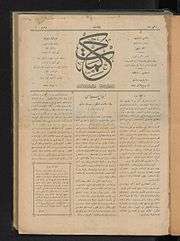Hikmet (magazine)
The weekly journal Hikmet (Ottoman-Turkish: حکمت; DMG: Ḥikmet; English: "Wisdom"), published in Istanbul from 1910 to 1911, was one of the first sufistic journals that were founded during the Second Constitutional Period.[1] It was published by Şehbenderzâde Filibeli Ahmed Hilmi (1865-1914), a Turkish Sufi, author and thinker. The journal had the subtitle “Unity is life and dissension is death“ („İttihad hayattır, tefrika memattır“).[2] Two volumes with a total of 79 issues were published and covered political, economic and social topics as well as articles on philosophy, islamic mysticism and sufistic literature.[3] Hilmi's criticism of the “Committee of Unity and Progress” (İttihat ve Terakki Cemiyeti) ultimately led to the suspension of the journal Hikmet.[4] In addition to Hikmet Hilmi also published the journals Çaylak, İttihat-ı İslam and Coşkun Kalender.
 | |
| Categories | Sufism |
|---|---|
| Publisher | Şehbenderzâde Filibeli Ahmed Hilmi |
| First issue | 22 April 1910 |
| Final issue | 22 September 1911 |
| Country | Ottoman Empire |
| Based in | Istanbul |
| Language | Ottoman-Turkish |
| Website | Ḥikmet |
References
- Stephane A. Dudoignon et al.: Intellectuals in the Modern Islamic World: Transmission, Transformation and Communication, New York 2006, p.78.
- cf. Ḥikmet, 1910–1911.
- A. Koçak: Bir Balkan Muhaciri: Filibeli Ahmed Hilmi Ve ‘Hikmet’ Gazetesinde Balkanlar, Filibeli Ahmed Hilmi And Balkans In The Newspaper Of “Hikmet, In: Motif Akademi Halk Bilimi Dergisi (Motif Academy Folklare Journal), 2012, p. 252-273.
- Ahmet Şeyhun: Islamist Thinkers in the Late Ottoman Empire and Early Turkish Republic, Leiden 2014, p. 165.
Further reading
- Stephane A. Dudoignon et al.: Intellectuals in the Modern Islamic World: Transmission, Transformation and Communication, New York 2006.
- Adeeb Khaled: The Politics of Muslim Cultural Reform: Jadidism in Central Asia, Los Angeles 1998.
- A. Koçak: Bir Balkan Muhaciri: Filibeli Ahmed Hilmi Ve ‘Hikmet’ Gazetesinde Balkanlar, Filibeli Ahmed Hilmi And Balkans In The Newspaper Of “Hikmet, In: Motif Akademi Halk Bilimi Dergisi (Motif Academy Folklare Journal), 2012.
- Ahmet Şeyhun: Islamist Thinkers in the Late Ottoman Empire and Early Turkish Republic, Leiden 2014.
External links
- Online-Version: Ḥikmet
- Digital Collections: Arabische, persische und osmanisch-türkische Periodika